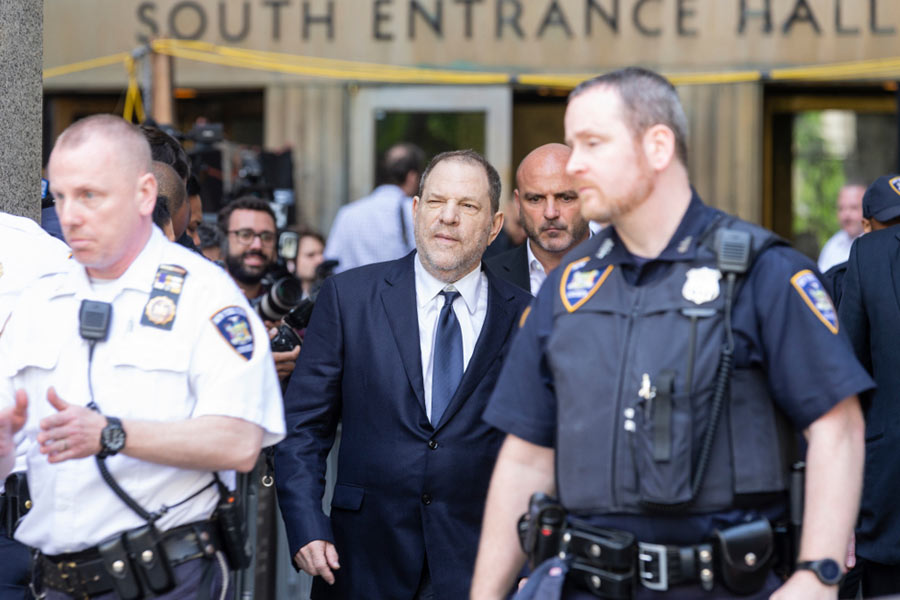The decision by New York’s top court Thursday to overturn the conviction of Harvey Weinstein on sex crime charges raised many thorny legal questions. Perhaps chief among them: Will it bolster his chances of a successful appeal in a similar case in California?
Weinstein’s lawyer in California, Jennifer Bonjean, plans to file that appeal next month, and has said she believes the New York decision helps her chances of winning. In both cases, prosecutors offered witnesses who said they had been assaulted by Weinstein, the disgraced Hollywood producer, even though their accounts were not tied to criminal charges.
Prosecutors in sexual assault cases sometimes use such witnesses to establish a pattern of behavior, but it can be a risky move because defendants are typically supposed to be judged only on the crimes with which they have been charged.
The tactic was at the heart of the 4-3 decision Thursday by New York’s Court of Appeals, which concluded that the judge who presided over Weinstein’s case in 2020 had deprived him of a fair trial by allowing those witnesses to testify.
Weinstein is expected to appear in State Supreme Court in Manhattan on Wednesday for a procedural hearing that is the first step for prosecutors to restart the criminal case to try him again.
New York and California law differ on the crucial issue of witnesses. The office of the Los Angeles district attorney, George Gascón, said that California’s law, unlike New York’s, allows evidence, at a judge’s discretion, that shows a defendant’s “propensity” to commit sexual assault.
“Although we do not know what arguments the defense will raise on appeal, we are confident that our convictions will withstand appellate scrutiny,” Gascón’s office said in a statement. “Our office stands ready to see that Mr. Weinstein faces the serious consequences of his deplorable conduct.”
Gloria Allred, who represented three of the victims involved in Weinstein’s Los Angeles trial, said the “prior bad acts” witnesses admitted at that proceeding were allowed under a state law that permits testimony from these witnesses if it is used to prove motive, opportunity, intent, preparation or a plan to commit a crime, or whether the defendant could have reasonably believed an alleged victim consented.
In contrast, Allred said, New York courts see such testimony as “more prejudicial than probative.”
In the California case, in which Weinstein was convicted of raping an Italian actress in 2013, the judge allowed four witnesses whose accusations were not tied to criminal charges. Testimony from accusers, whether their allegations are tied to charges or not, can be emotional and elicit strong reactions.
When Jane Doe 1, the actress Weinstein was convicted of raping, recounted graphic details of the crime at trial, her hands trembled. She paused often and took slow, deep breaths. The judge ended the day early when she broke down sobbing.
Allred, who has also represented sex crime victims in New York, said she does not believe the New York decision would affect Weinstein’s conviction in California.
In New York, testimony and evidence related to uncharged crimes must be used “to show a material element to the prosecution’s case,” said Douglas H. Wigdor, who represented two women who testified at Weinstein’s Manhattan trial and whose allegations were not tied to the crimes at issue there. That meant trying to establish that Weinstein knew his accusers had not consented to sexual activity, Wigdor said.
“That’s why the additional evidence of other women who he did this to is important, to show that there wasn’t a mistake on his part, that he knew, that he knows, when someone’s not consented,” Wigdor said.
In California, judges have much greater discretion in determining whether to admit such evidence to speak to the person’s character, he added.
Weinstein, 72, was sentenced to 16 years in prison in the California case. The jury deadlocked on charges related to accusations by two other women, and acquitted Weinstein of one count of sexual battery involving a massage therapist.
Bonjean, Weinstein’s lawyer in California, said that the witnesses were only one of several issues she might raise in her appeal; others included evidence that was excluded at trial and the jury’s being informed of Weinstein’s New York conviction. She said she would also contest the length of his sentence, which was increased because of the prior conviction in New York.
In the New York case, Weinstein was sentenced to 23 years in prison after he was convicted of forcibly performing oral sex on a TV and film production assistant in 2006, and of third-degree rape for an attack on an aspiring actor in 2013. He was acquitted on the most serious charges — two counts of predatory sexual assault and first-degree rape.
Weinstein has been imprisoned in upstate New York, and Alvin Bragg, the Manhattan district attorney, has vowed to retry him. Weinstein has maintained his innocence.
Cynthia Godsoe, a professor at Brooklyn Law School and a former public defender, said so-called Molineux witnesses — a term used in New York for people who testify about uncharged crimes — are typically used with great restraint. She said the argument used in Weinstein’s New York appeal was less likely to succeed in California because of the different laws.
She added that she had long believed using the Molineux witnesses in the New York case was a mistake, arguing that bringing in evidence that prejudices a jury against a defendant is fundamentally unfair.
“Like when you have someone like Harvey Weinstein that you’re like, ‘OK, he’s so terrible, and there’s so many uncharged assaults that we want to make sure he is locked away forever,’” she said. “But that makes a really bad precedent for most accused people.”
The New York Times New Service










